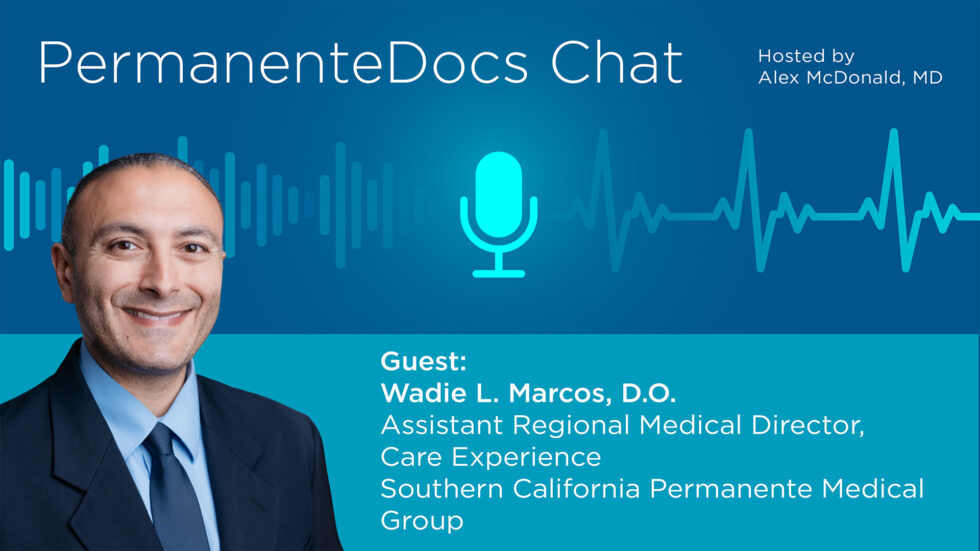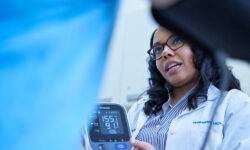
![]()
![]()
![]()
In this episode of the PermanenteDocs Chat, host Alex McDonald, MD, discusses the latest innovations in care experience with Wadie Marcos, MD, access and experience lead with the Southern California Permanente Medical Group. Dr. Marcos shares his insights on the changing health care landscape, focusing on improving access and the care experience.
They candidly discuss the unique challenges and opportunities health care organizations face in meeting patient expectations. Dr. Marcos highlights some groundbreaking practices at Kaiser Permanente, like enhancing booking systems and smoothing the onboarding process for new members to increase satisfaction. They also talk about the crucial role of soft skills in care experience, the importance of trust-building by physicians, and how a team-based approach enables high-quality care.
Dr. Marcos also covers the role ethical, evidence-based medicine plays in practicing medicine today and how disease prevention is central to Kaiser Permanente’s mission.
Don’t miss out on this compelling conversation — watch the chat on YouTube or listen to it on your podcast platform of choice. And don’t forget to subscribe so you don’t miss future Permanente Medicine programming.
Guest
Wadie L. Marcos, D.O. Assistant Regional Medical Director, Care Experience Southern California Permanente Medical Group
Podcast transcript
Transcript is autogenerated. Although edited for clarity, it should not be considered an exact replication of the podcast and may also be updated as needed.
Alex McDonald, MD: Welcome everybody to today’s PermanenteDocs Chat. I’m your host as always, Alex McDonald. I practice family and sports medicine as part of the Southern California Permanente Medical Group here in Fontana, California. And today we have an amazing guest, Dr. Wadie Marcos. Dr. Marcos, thank you so much for joining us today.
Wadie Marcos, MD: Thank you so much, Dr. McDonald for having me, and thank you for hosting these sessions. I find them very stimulating. I just listened to the one on national cancer care that we’re doing, which was very informative and pretty impressive.
AM: Thank you so much. Today we are talking about the patient care experience specifically here at Kaiser Permanente, but also in general. Dr. Marcos, tell us who you are and what you do.
WM: Like you, I’m a family physician. I joined SCPMG straight from residency in 2006. I trained near you at Arrowhead Regional Medical Center, if you’re familiar with it. And I did my addiction medicine rotation in the Fontana Kaiser Permanente facility. Since then, I became in charge of a building and then two buildings and then I came to regional access and now with regional care experience.
Defining the care experience and why it includes access
AM: Wonderful. And again, let’s identify terms here. We hear the term care experience. What does patient care experience mean to you and what does it mean globally across health care in general?
WM: Yeah, it’s a fuzzy term to be honest, and it means a lot of different things to a lot of different people. I’ll share what it means to me and how it applies to my role, but I think it’s actually way broader and way bigger than that. For me specifically, it’s how do we make a patient feel. That’s one component. And the other is how do we make it easy for the patient to come in and see us. If I had to give it two terms, it would be service and access, and that’s what my role is.
Access is so important because that is the reason the patient signs up with health insurance is so that they can get care, whether primary or specialty. We have to get that right or else the patient [is] going to go to a different entity or a different insurance company. The other thing that’s part of this is service, which is how do we make the person feel. That is also very important because that’s what can drive loyalty. It also drives patients to connect with us.
One of the things that I enjoyed when I had a panel is going on a journey with the patient. [Sometimes] they want to hear from me even more than a specialist because of that connection that we have with them. It drives loyalty, it drives them to want to be with us. And it’s really important for any company to stay in business. You want that person to be loyal to you and to tell others about you. That’s why I think it’s very important and critical work to do. Some of it is math and some of it is soft skills that we have.
The evolvoing landscape of patient expectations
AM: Absolutely. I think sometimes we don’t necessarily realize the importance in the role that each of us individually as physicians can have with patients both within the exam room but also globally. Can we talk more about the evolving landscape within which we all have to operate as Kaiser Permanente, but also as physicians and health care providers and how patients’ perceptions and the experience they have can impact those choices and the business of medicine?
WM: I’ve been through multiple focus groups to ask patients, what do you want from an access perspective? To your point [about] the business [of health care], we have to deliver if you want to be viable, even if we’re a solo practice.
The expectations that patients have said 10 years ago compared to a few years ago is they wanted access back then and now they want it sooner. So that is a very different thing. Everything is right here, right now. We are so used to going on the phone, clicking something, and then if it doesn’t give us the result right away, we think the world is falling apart. The second thing that is different is access to information.
If you type in any symptom, cancer comes up. So it’s not uncommon that many patients start to ask certain questions and I’m like, did you happen to consult with Dr. Google before coming to see me? Once we get that out in the open then I ask them, what are you afraid of? And then I usually say, is it cancer? They say yes, and then we talk through it and we try to help them.
But it’s not uncommon that patients are worried because they think they have something serious, which many times they don’t. But they need us to help them. And it’s also not uncommon that they come in expecting a certain workup. In your world, in sports medicine, I’m sure there’s lots of requests for MRIs.
For example, last week I had a patient on the phone. He said he didn’t even twist his ankle. Just [that] his ankle hurt for 2 days and he wants an MRI. I said, can I at least examine you? And then we can decide together. But also they want the specific treatment and I think we need to merge all that. We can’t ignore what they have, but if we do everything that the patient says, we could end up hurting them. We need to do the right thing in evidence-based medicine. So that makes it challenging, but also I think it makes it fun so that we can really give them our best.
AM: I completely agree with everything you just said. I’ve had experiences where a patient reached out to me and asked what I think about [them] having gallbladder surgery? And I didn’t realize the patient had been seen in urgent care, had gallstones and colic, and was referred to a surgeon. The patient reached out to me and asked what I thought or recommended because I had built that relationship with that patient, I had built that trust. And that is so important when it comes to helping patients feel supported, feeling validated, but then also balancing or negotiating [that with] what a patient thinks they need or what Dr. Google tells them that they might need versus what they actually need and what is really evidence-based medicine. I think the art of being a physician in this day and age is taking all the medical information and all the knowledge that we have and helping the patient understand how it applies to them as an individual. Anyone can find information out there, but learning how to sort through, what’s good information, what’s bad information, and how it applies to the individual patient is why I’m not worried about physicians being replaced by AI because that soft skill is critical when it comes to helping patients.
WM: That says a lot [that] the patient wants to hear from you if they should get that gallbladder removed or not.
Care experience innovations at Kaiser Permanente
AM: Let’s shift now to the systems approach. Obviously I’m extremely proud of how Permanente Medicine really practices high quality value-based care. Can you give us examples of different innovative practices we’ve created across the organization regarding patient experience and how we can adapt again, like you mentioned in this changing landscape?
WM: One of the amazing things that we’ve been doing recently is that all the regions [have been meeting]. We bring a topic, we speak about it, and then every region says what they’re doing. And then every region can pick up something from someone else. I’ll give you a couple of examples. Last year we [met] to talk about how to make the booking experience of our patients superb, how do we give them the red-carpet treatment. Let’s say you see someone and they have ruptured Achilles and you need to send them to orthopedics, they need surgery.
When you put in that referral, how do we make sure that that patient walks out with the specialty appointment versus phone tag. We’ve been enhancing that and we share that with the other markets. But then as the other regions were sharing, a couple of them said, the way we do this, not just in the office, we have the patients go and do self-booking online. So we tried a pilot [where] the patient can book directly, because sometimes [they are] not ready to book when they’re with us because they [have to] check in with their significant other, check their schedule, check with work. It’s been very promising and we are planning to expand it. So we have two ways to do red-carpet treatment for a patient’s experience with booking to show how integrated we are.
The new thing that we’re working on this year, that all the different regions are working on together to be able to enhance the experience is how we welcome our new members. We are a large complex system, so how do we show them how to navigate? In the last couple of weeks, every region has been sharing what they’re doing and then we’re trying to take the conversation to the next level. What is a minimum viable product that we want anywhere where you are a Kaiser Permanente member so that you get that same amazing welcoming experience? How do we onboard you when you come in with medications from outside [of our system]? How do we make sure that there’s no interruption to that? How do we make sure [medications are] formulary so it’s cost effective for you?
One more thing that I’m very proud of, that I think is going to be huge, a big deal, is training our staff from a care experience lens. Back in the day, onboarding of our staff used to be here’s your badge, here’s this, here’s that, here’s the bathroom, here’s how to get into [the electronic health record system], and be nice. We said, if we want to be known for care experience, we want to spend time, we want to invest. So everyone has a mandatory 4-hour training and it’s the same across [Kaiser Permanente in] Southern California, 4 hours of care experience skills that we expect and that we will hold everybody accountable for. I’m very excited and I think it’s going to be a game changer and it’s going to take us to the next level.
AM: I think that’s such a great experience. And not to overuse the sports medicine euphemism too much, but I always say that medicine is a team sport, right from the check-in receptionist to the LVN or the MA who does the vitals to my visit, to the RN who follows up or does the vaccines. And having everyone be on that same page and share the same message is so critical to improving quality. Also, I cannot tell you how many times I walk in the room and the receptionist reminded the patient that they’re due for their Pap [test], and the LVN reminded the patient that they’re due for their Pap [test] and prepped everything. And I can walk in and say, Hey, you’re due for your Pap [test]. You’re all set. Let’s get this important cancer screening test done. And the patient may not have been there for their Pap [test], they’ve been there for something entirely different.
But when we can all engage together as a team and help support that patient to get the high-quality evidence-based care they need, we can literally save lives and prevent disease. And that’s something that I’m extremely proud of within Kaiser Permanente. And I think that experience and that quality that we all have within that whole system is really valuable. I love this new staff onboarding process, thank you for that work.
How integrated, value-based care impacts the care experience
I want to jump back to something you said about the patient onboarding process. And I have this all the time where I have patients who are new to Kaiser Permanente and they expect that they need to come in to get their labs done and they have to come in to get their medication refilled. And I’m like, look, I can do a lot of this virtually. I can do a lot of this through the secure patient messaging system. And patients don’t necessarily understand how accessing care can be much more streamlined within a big system with a lot of technology and tools. So can you tell us about the patient onboarding process and how that compares to other organizations? What are we doing differently and how are we doing it better?
WM: I’ve experienced it when I was in charge of a couple of buildings in the South Bay area. Yes, you and I can do this virtually and help the patient out without coming in, but what if we take that off your plate, Dr. McDonald. The way it works as we enhance it and expand it is you have a medical assistant or staff call the patient and ask them what their medical conditions are and they populate that in our problem list. They ask them are they taking any medications? And then they also do their allergies, the usual stuff, their history.
If they say yes [to medications], they’re transferred to pharmacy and then pharmacy will make sure those medications are ordered and are formulary. But they take it a step further. Let’s say a diabetic comes in and they’re on metformin. There will be an A1C, there will be a creatinine, there will be an ALT and all the things that are pertinent for that condition. Then let’s say someone comes in with rheumatoid arthritis and is followed by rheumatology. They’ll also pen the rheumatology referral. We get one message, everything is in it, and all we press is sign. And so that’s what we’re hoping to take off your plate and my plate. That’s when the patient comes in, they’re already known to us, and then we’re ready to spend more of the time, rather than collecting information, making that personal touch, making every moment count, making it very powerful. I can’t think of any system that could do this better. And I’ve tested it, it’s amazing, but it needs to be everywhere.
AM: That’s a great example of how the patient is the center of all the work we do here within Kaiser Permanente. And I know that with administrative complexity, administrative burden across the health care landscape, having physicians do work where connection with the patient and having difficult conversations and having the other team members do work at the top of their license to help support that patient journey no matter how they enter the system. And I think that’s such a great example and I’m really proud of the work that we do at Kaiser Permanente because of that.
WM: I love it.
Tips for physicians to enhance the patient care experience
AM: You’ve already touched on a lot of topics and addressed some of my questions, so I don’t want necessarily to go back or backtrack, but when it comes to engaging clinicians and physicians in particular, I do think we have a really important role when it comes to the patient care experience. And I’m drawing a blank on who said it, but people forget what you do and what you say, they remember how you made them feel. What advice would you have for our clinicians and our physicians to really think about how we can help patients feel supported and heard? Are there any resources or any tips or tricks you have for us?
WM: It’s going to sound too simple and obvious, but I think it’s been transformational for me when I had the light bulb turn on. Sometimes when things are busy and when things are tough, we can be a little off our game. But one thing that really resonated with me is treat patients like family and friends. Being genuine, caring, authentic, that resonates with them and it builds their trust. It builds loyalty. It actually leads to patient outcome, which you hit on earlier. They become more compliant with medications because they trust us and they know that we actually care about them. We’re not trying to push things at them.
And I would say invest in each moment with our patients. They are our journey. They are our mission. I’ll tell you something, that one of the physicians in the building, when I was leading it, this guy had the best scores and patients were very pleased with him. And he is the fastest one out of the building because you’d think it’s the other way, you’d think you’re going to be slow if you’re very, very caring and all these things. But his patients love him more than anybody, and he’s the first one out.
So I talked with him, I said, Hey, what’s your secret? And he told me something that I thought, this guy’s crazy. There’s no way. He said, here’s what I do. I sit down, I don’t stand. Okay, I do the same. I was like, yeah, whatever. That doesn’t make you faster. And he said, I say, how can I help you? So open-ended, like we were taught in med school and in residency, okay. I said, okay, I do that. And then he says, after they’re done, I say, is there anything else? And I said, no, you’re crazy. There’s no way. If you ask that you’ve just opened the door, you’re going to be here forever. I’m asking you because you get out of here fast, yet you resonate so much with the patients.
He says, that’s what I do. And he says, almost always, they never say there’s anything more. Occasionally there’s something and I take care of it and they’re very happy. I took that and I wrestled with it, to be honest, a lot. I was like, I can’t do this. This guy’s crazy. There’s no way. Then I decided to try it, and he is right. When we are really genuine and we care about the patients and we say it’s as if I have all the time in the world, even though I know our time is short and is crammed, it resonates, actually goes faster. I know people might think I’m crazy, but try it because I thought it was crazy and I tried and it was amazing.
AM: Well, it’s funny actually, I do something very similar at the end of any patient encounter. I say, what questions do you have? I love it. It’s a little bit of a nuance but makes a big difference. It centers the patient and helps them feel comfortable to be able to bring issues forward. And again, we can’t address everything in every visit, and sometimes I’ll bring patients back and say, Hey, look, let’s focus on the things we need to do today in the exam room, and then we can talk about some of those other things through a telephone visit or a video visit in a week or two. And sometimes you have to help the patient when there’s a big list. But I definitely agree that keeping things centered and helping that patient feel validated and feel heard and feel like they’re the most important person in the room at that moment, that is so critical.
That’s a great way to wrap this up. I’m going to ask you my last question, what makes you most proud to be a Permanente physician?
WM: I love that we are agnostic to insurance. I love that we are focused on the patient in front of us. We are looking at how to resolve the issue using evidence-based medicine and in the least amount of touches, being patient-centric.
I love that we don’t have to worry. If we need to order an MRI, we order the MRI. If I need a specialist, I don’t have to go through a crazy approval process, [the patient] will see the specialist. I love that we focus on disease prevention. I also love that we do all the screenings, which is not disease prevention, but it’s early detection. This way we can have early treatment for the best outcome so that our patients have the best quality. I love that. We are so ethical.
When I first came [to Kaiser Permanente], my plan was to be here for three years and then open my own practice. Then after I stayed here, I said, I would be crazy to go anywhere else. I want to be here, retire here. I want to receive care here. There’s nowhere else I’d rather be. I love Permanente Medicine.
AM: Wonderful. Well, that’s such a great summation and really appreciate your time today, and thank you for sharing your insights and thank you for all the work you do to support patients, but also support physicians supporting patients and the whole care team.
WM: Thank you so much, Dr. McDonald.




